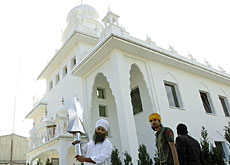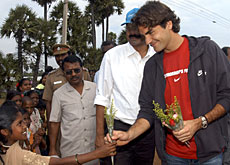“I am as Swiss as anybody”

Lathan Suntharalingam came to Switzerland from Sri Lanka as a teenager 20 years ago. Speaking not a word of German, he settled in the central city of Lucerne.
Today, he is a politician who advocates a progressive immigration policy including language courses and support for new arrivals.
Lathan sprints up the stairs to his top-floor flat in the building he owns along with his parents and brother. It has a modern, bright and clean look: a large red sofa, a glass table and on it dozens of chocolates wrapped in red foil with Swiss crosses.
He introduces himself by his first name, Lathan. This is a good thing – his last name is difficult to pronounce and impossible to remember.
Lathan is completely unlike the stereotypical Tamil in Switzerland, who works hard in the catering trade, keeping a low profile, speaking German badly, retiring to the Tamil community after work and having little to do with the Swiss.
Although he has little contact with Sri Lanka – only one uncle still lives there –he is aware of his roots. He is saddened by the civil war going on there and the suffering of the people.
“My links are strong. I will not shy away from my ancestry,” he told swissinfo.
Identity crisis
Arriving in Switzerland aged 14, Lathan had to join a special class for new immigrants, but learned quickly and made the transition to secondary school. He was the only Tamil in the school.
“I was really searching for an identity. At 15 years old, I already wanted to be like the Swiss and not stand out,” he said.
In the 1980s, members of the Tamil community in Switzerland were widely made into scapegoats and called freeloaders.
“I felt targeted. This was not an easy time for me,” he said.
Lathan worked hard to counter this bad image and show what he was capable of. But at the time, his German was still basic and full of mistakes.
“To learn German, I first had to suppress my Tamil language.”
Like many Tamils awaiting the outcome of asylum applications, the Suntharalingam family lived with uncertainty for years. Should they move on to a different country? Should they go to Canada or Britain? Or to India, where their relatives lived?
After years of waiting, they were finally allowed to stay on humanitarian grounds.
Civic duties
In 1997, Lathan was one of the first young immigrants in the city of Lucerne to become naturalised. One year later, he started the obligatory military service.
“I did my duty,” he says.
Lathan went on to qualify as a nurse and later, to work in intensive care.
Along with friends of different nationalities, he became involved in integration projects. “We wanted to show that people don’t have to be enemies, but that there is a common way,” he said.
Lathan’s vision was a progressive immigration policy; he had had enough of leftwing circles who looked away, and others who made scapegoats of immigrants.
With an energetic political team behind him he made it into the Lucerne city parliament in 2004 and three years later, won a seat in the cantonal parliament.
“Thanks to the Swiss passport, I can participate in the political system. Without it, I would have had no chance,” he said.
Lathan has endorsed the “challenge and support” integration model implemented in Basel, in northern Switzerland. But he says the model needs framework conditions, like language courses with recognised diplomas to be effective.
“It is in the interest of society, right from the beginning, to support all population groups and put in place the necessary infrastructure. This pays off economically,” he said.
Their own world
Lack of integration and insufficient language skills are reasons why many Tamils withdraw to their own community.
“They feel comfortable being isolated, and it is comfortable,” Lathan said. “In their own circles, they can achieve what they cannot achieve in the workplace, because they lack the language.”
He has strong words for the patriarchal behaviour in some families, where girls are strictly controlled and where forced marriages are still a reality.
“Here, the authorities lack awareness. They do not realise how big the psychological pressure on these young women is. The law must protect these people so they can become free.”
Lathan envisages a just society where people are equal and live peacefully with each other.
Criticism
That a young and energetic politician receives criticism in come circles, including from within his own community, is to be expected.
“I have been insulted, even by my own people. Even the Lucerne carnival newspaper jokes about me.”
One political party has even accused him of wanting to build Hindu temples throughout the canton. Lathan professes no religion but practises Zen meditation.
Criticism will not hold this politician back: he says his work will continue, even with the negative reactions.
“I do not fit the immigrant pattern. If somebody is treated in a racist way, I react. I feel just as Swiss as somebody named Mr Meier. My name and my skin colour do not make me a second-class citizen.”
swissinfo, based on a German article by Gaby Ochsenbein in Lucerne
Lathan Suntharalingam was born in 1974 in Jaffna, northern Sri Lanka.
In 1988, along with his mother and two siblings, he arrived in Switzerland, joining his father who was already here. He enrolled in an integration class for immigrant children and then in secondary school.
In 1998, he became a Swiss citizen and in 1999, graduated from the air force’s recruit school in Payerne.
In 2000, he qualified to be an intensive care nurse.
In 2003, Lathan took part in post-graduate studies in intercultural communication at Lucerne University, and in 2007, graduated as a social worker from the College of Social Work in Lucerne
In 2004, he was elected to the Lucerne city parliament, and in 2007, to the cantonal parliament.
He is currently studying law at Lucerne University and employed by the cantonal hospital
Lathan Suntharalingam is married to an Indian woman and is the father of a 2-year-old daughter.
Switzerland is home to around 43,000 people from Sri Lanka. The majority are Tamils.
10,000 Tamils have a Swiss passport.
About 90 per cent of non-naturalised Tamils have a residence permit.
The influx of Tamils began during the country’s civil war in the mid-1980s.
Many Swiss originally reacted negatively to this. Today, there is less controversy.

In compliance with the JTI standards
More: SWI swissinfo.ch certified by the Journalism Trust Initiative












You can find an overview of ongoing debates with our journalists here . Please join us!
If you want to start a conversation about a topic raised in this article or want to report factual errors, email us at english@swissinfo.ch.